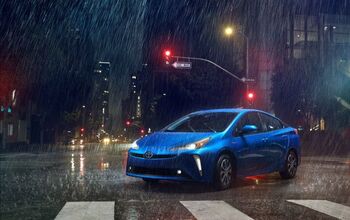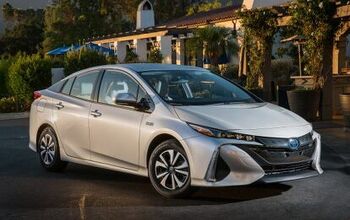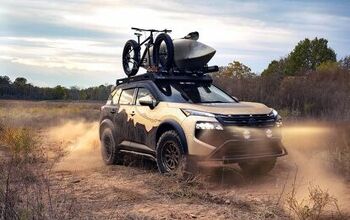Four Questions About the Toyota Prius
I have nothing against the Toyota Prius. It’s the car’s mystique that irks me. You know what I’m talking about: the whole “Toyota Pious” thing. As someone who’s read rational reports from Prius-owning TTAC commentators, as a pistonhead who understands that there’s more to driving a Ferrari than beauty and performance, I swear I’m OK with the hybrid’s PC mantle. But the Prius’s high MPG numbers and green street cred tend to stifle the debate on some important points.
Point One — Are Prius Owners Hypocrites?
Prius drivers swear, “It’s not about all about me.” I’m not buying it. If owners didn’t want people to know that they’re doing their bit for the environment, why has the Prius’ distinctive shape been such a boon to sales? Is the Prius that much more fuel-efficient than its competitors that it deserves to dominate the US hybrid market?
Aside from a small badge and different wheels, the Honda Civic hybrid looked just like every other Civic. Did it sell well? No. Honda Accord hybrid? Nope. Is it any wonder the new Honda Insight is a Prius clone?
There’s no question that the Prius gets great mpg (51/48 for 2010). But I suspect Prius drivers want more: they want us to know they’re saving the planet one car at a time.
Again, that’s OK. But there are limits. A Prius is not a free pass for the hybrid’s owner’s total “carbon footprint.” Or is it? This summer, how many Priora will park in front of chilled McMansions?
Point Two — Shouldn’t the Prius be More Energy Efficient?
Surely a driver concerned about the environment can open and close their windows manually. The electric windows extra motors and wires add unneeded weight and use precious energy. By the same token, why air conditioning? Isn’t the A/C compressor and all of its needed wiring, blowers, hardware etc. wasting energy? What effect does r134a have on the environment?
Why does the Toyota Prius offer an optional ten speaker JBL sound system? For years, we got by with just two or four speakers. Prius drivers could listen to their favorite tunes without the extra power, draw and weight of speakers and amplifiers.
And what of the leather seats? Shouldn’t Toyota fashion the Prius’ chairs, carpeting and other interior materials from some composite derived from recycled plastic bottles or part soybean oil (a la Ford)?
And what about the extra money spent on all of these options? Wouldn’t it be better if Prius buyers purchased de-contented vehicles and sent the money to an appropriate environmental organization?
Point Three — Is the Prius REALLY That Efficient?
No question: the Toyota Prius is a clever piece of kit. The car’s Synergy Drive system’s internal combustion engine (ICE) generates electricity for a battery which supplants or assists ICE power in various ways at various times, according to engine load. The Prius also recaptures and reuses braking energy. Equally important, the car sits on skinny tires. And it’s slow.
So what would happen if you equipped a Prius with the world’s most efficient internal combustion engine; a powerplant that would match but not exceed Toyota’s Synergy Drive’s Prius performance?
I’m not suggesting a HUMMER is less energy intensive to produce, operate and recycle than a Toyota Prius. And again I’m not against the Prius, Toyota or Prius owners per se. But it should be asked: is the Prius set-up the best use of our resources?
The same question applies to electric cars. There is a lot of talk in the media about the merits of the electric car and not much debate about the reality. Electric cars need batteries. Batteries need electricity [mostly] generated by fossil fuels. A gallon of gasoline far exceeds a battery in its energy density.
And what of the batteries charge level?
A gasoline car maintains its performance right down to the last milliliter of gasoline. Whether you have a full tank or a quarter tank, there is no discernible performance loss. A battery, on the other hand, shows a significant power loss in a non-linear fashion as it discharges. Ever see what happens when your electronic device gets down to 25 percent power? It performs erratically. Discuss. Meanwhile, I leave you with one final question:
Point Four — Is There A Better Way?
Take the existing Corolla and strip out any unnecessary weight. Next, maximize the engine for gas mileage. The target demographic certainly be able to tolerate decreased acceleration times in the interest of more efficient fuel consumption. (Toyota has extensive experience with diesels; a diesel powerplant should be assessed as well.) Fit the interior with lightweight materials or recycled composites.
How would this low-touch, high-mileage Corolla carbon footprint stack up against the Prius? And if the stripper Corolla offered substantially better efficiency than the Prius at the same price, would Prius owners make the switch?
More by Admin
Latest Car Reviews
Read moreLatest Product Reviews
Read moreRecent Comments
- ToolGuy If these guys opened a hotel outside Cincinnati I would go there to sleep, and to dream.
- ToolGuy Michelin's price increases mean that my relationship with them as a customer is not sustainable. 🙁
- Kwik_Shift_Pro4X I wonder if Fiat would pull off old world Italian charm full of well intentioned stereotypes.
- Chelsea I actually used to work for this guy
- SaulTigh Saw my first Cybertruck last weekend. Looked like a kit car...not an even panel to be seen.


































Comments
Join the conversation
The sheer fact that it "Irks" people gives me a big charge. As a 2010 Prius owner, I didn't buy it cuz it makes me look cool. Heck, I'm worried that some Fox news lemming might key me or run me off the road. I bought it because it is one of the most advanced cars on the road. I bought it because Toyota listened to users and re-crafted the 2010 to meet everyone's desires. Bigger, faster, more powerful, better-looking, much more MPG and lower price. Heck, they put the software hacks people devised - as push-buttons on the dash. If I want to leave the whole line-up at the light in the dust, I hit the "Power" button. A little chirp from the front tires and I'm gone. If I want to sneak up on the house late at night- I hit the EV button and go Stealth-Glide mode. I'm getting right at 60mpg consistently in town. I got 57 mpg on a road trip last month. Say what you will, but those numbers rock. So, you think Americans but cars without any regard to their own identity? BS. I'm a techie with a slight green streak...fits me perfectly. And watch, it is going to get some serious awards this year.